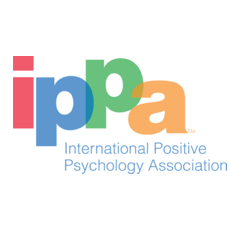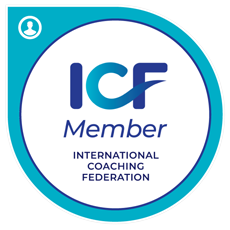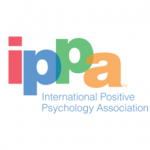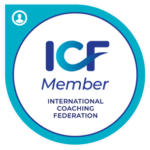Teacher programs
There is no one best-fit for all schools.
We offer a range of options to cater to your needs.
One-off training sessions may support your existing staff wellbeing strategy
Or we can help you create a realistic & meaningful wellbeing strategy for your school.

Our approach draws on the science within:
- Positive Psychology
- Coaching Psychology
- Social and Emotional Learning
- Psychological Health and Safety
We address wellbeing across three layers:
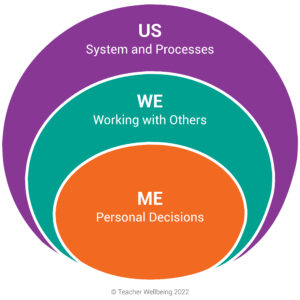
3 WAYS TO ENGAGE WITH DANIELA
I come to you
I am based in Sydney and love
to travel so can come to you for
your staff needs
Consulting
I support you to transform your school culture and embed lasting change
Meet online
I have a selection of easy to access, self-paced courses for you to do on your own or with your teams
Next... Choose the Program that works for you
Phase 1
UNDERSTAND WELLBEING
& build ownership
1 Month
One workshop
All staff
Pre & Post Resources
Phase 2
GROW WELLBEING
Habits
6 Months
Two workshops
All staff
Pre & Post Resources
Consulting session
Phase 3
SUSTAIN WELLBEING
& a positive culture
12 Months
Two workshops
(All staff)
One workshop
(Leadership team)
Pre & Post Resources
Consulting to Implement Change
Book an obligation-free “DISCOVERY” session
20min call to see what would work best for your context
THE TEACHER WELLBEING TOOLBOX OF PROGRAMS
Session 1
Move from Exhausted to Energised
Learn;
- Global challenges teaching and non-teaching staff face in schools
- Statistics on educator stress and why prioritizing wellbeing matters
- The 5 dimensions of wellbeing and how to unpack them
- The 3 keys to unloacking wellbeing
- The ME-WE-US Model to explain who is responsible for wellbeing at work
- The science of wellbeing at work
- How to feel valued and appreciated
- The triple A action plan for self-care
- Create your personal wellbeing plan
Session 2
Navigating Change with Mental Toughness
Learn;
- How we respond to change
- Self Determination Theory (Deci & Ryan) as a motivator for change
- History and foundation of mental toughness as a measurable construct
- The 4C’s of mental toughness as a model for managing change – Control, Committment, Challenge, Confidence
- How to shift learned helplessness and move towards empowerment
- Use the 4C’s when planning with upcoming challenges
- Map the 4C’s to the National Curriculum Personal and Social Capability Framework
Session 3
GROW with High Quality Connections
Learn;
- The power of High Quality Connections (Prof Jane Dutton)
- Foundations of coaching conversations versus mentoring
- The enabling factors of Collective Teacher Efficacy (TCE)
- History of coaching psychology
- The 3 elements of effective coaching conversations
- Solution-focussed questioning techniques
- The GROW framework to scaffold authentic goals
Other TOPICS TO CHOOSE FROM
Pick and choose the programs that align with your stratgeic plan
These are:
1. Teacher Wellbeing Recharge and Take Control
2. Tackling the Overwhelm with Mental Toughness
3. Peer Coaching & Mentoring for Teachers
4. Leaders empowering HERO’s
5. Be your own SuperHERO
6. Embedding Staff Wellbeing – An Appreciative Inquiry Approach

1. Teacher Wellbeing Recharge and Take Control
Personal Wellbeing Tools to fill your own cup
Teaching is both stressful and rewarding, yet sometimes it feels like we are running in circles. The meetings are endless, admin requirements increasing and student needs demanding. If the system won’t change, how can we find our way through the maze to engage, inspire and connect with students for effective learning? Positive Psychology has emerged to provide the research and tools both in and out of the classroom.
In this program we;
- Discuss the global stressors for teachers and their impact on health
and wellbeing. - Explore a shared vision of wellbeing at work for staff and students
- Unpack the 5 dimensions of wellbeing and their relevance for school staff
- Discuss how mindfulness, character strengths and gratitude can become
simple habits - Use the research of Seligman’s five pillars known as PERMA to put
together a personal wellbeing plan.
“Thankyou for your very real, humorous and realistic strategies. I will not only take these strategies into my own life but look forward to integrating them into my classroom”
Jennifer White, Hunter valley Grammar

2. Tackling the Overwhelm with Mental Toughness
Practical strategies to manage uncertainty and navigate change
Schools are dynamic places with high demands and constant change. This session explores the strategies of elite athletes and high functioning executives who thrive under pressure and change. Grounded in the research of Sports Psychology and Cognitive Hardiness, participants learn the 4C’s of Mental Toughness (Control, Commitment, Challenge, Confidence) (Clough & Strycharczyk, 2011) to better manage everyday pressures.
In this program we;
- Explore the change curve and our responses to change
- Learn the evidence-based, psychological foundations of Mental Toughness
- Unpack the 4C’s of mental Toughness with practical strategies
- Identify & reflect on goals we are COMMITTED to achieving
- Identify and reflect on how areas we can and can’t CONTROL
- Identify and reflect on how we respond to CHALLENGE
- Identify and reflect on our level of CONFIDENCE as we achieve goals.
- Put all this together in a framework to better navigate change that can be
used with staff or students.
“Your enthusiasm and positivity is infectious. You helped me realise that I actually do have the ability to move from feeling swamped to possibility.”
Lisa Peterson, Northern Beaches Secondary College, Freshwater Campus
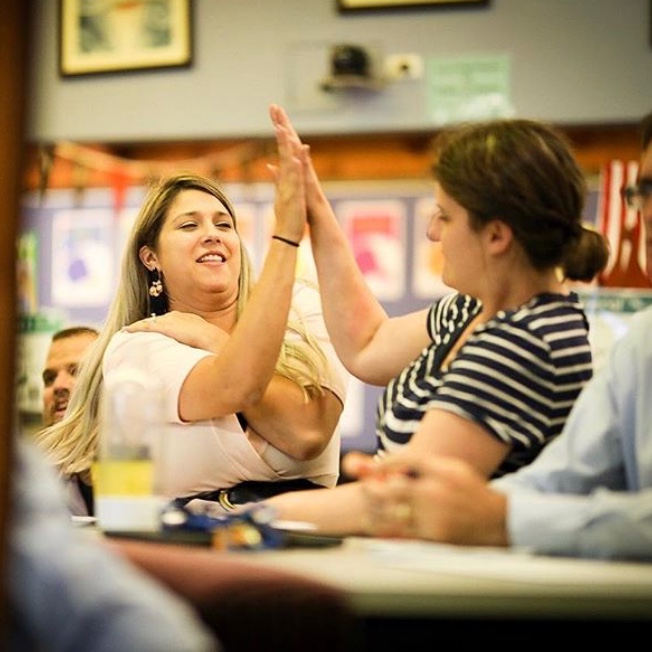
3. Peer Coaching & Mentoring for Teachers
Positive, solution-focussed conversations
As educators we are always learning, in fact great teachers are those who are able to reflect on their practice and identify, explain and model new and improved strategies to engage students (Leithwood, 2007). Peer mentoring is a growing practice where AITSL agrees that coaching offers teachers valuable tools to mentor each other as they grow in their various roles. Either way, coaching is a simple and effective, evidence based way to address teaching standards, develop professional practice and achieve personal satisfaction on the teaching journey.
In this workshop we;
- Discuss the similarities and differences between coaching and mentoring
- Identify the principles of coaching psychology and its links to Action Research
- Explore DISC Profiling to reflect on our ‘way of being’ as a mentor
- Practice coaching micro-skills for effective communication
- Experience the impact of problem-focussed and solution-focused questions.
- Apply common coaching framework in a peer conversation such as GROW or SMART
- Create either a personal or professional goals for future growth
“It was really helpful to have the time to think about my own learning goals as well as the coaching strategies to discuss options for achieving this – very practical and useful for both my wellbeing and that of my students”
Deb Lonsdale-walker, Mt St Michaels

4. Leaders empowering HERO’s
How school leaders can build the Psychological Capital of their staff
Teachers often look to school leaders for answers to their wellbeing yet school leaders often feel confused as to how to best support staff to flourish. While Professional Development is needed to help teachers ‘learn’ and ‘live’ wellbeing, competing for demands on time adds to the challenge. As knowledge changes and systems shift, it is our inner resources that can take a battering, or we can thrive.
Fred Luthans, an organisational psychologist, brings Positive Psychology to the workplace to suggests a focus on developing the Psychological Capital (PsyCap) of staff. PsyCap involves an understanding of Hope Theory, Efficacy, Resilience and Optimism, to strengthen our inner HERO.
In this workshop we;
- Give school leaders an opportunity to share their challenges and vision of wellbeing in their school contexts
- Unpack current wellbeing issues for staff including what is working well to support wellbeing
- Review the foundations of Positive Psychology as the science of wellbeing
- Identify the difference between personal wellbeing strategies and workplace wellbeing strategies
- Define Positive Organisational Behaviour and links to Psychological Capital (PsyCap)
- Explore the basic research of Hope Theory (Snyder), Efficacy (Bandura), Resilience (Masten), Optimism (Seligman)
- Identify strategies school leaders can use to inspire Hope, Efficacy, Resilience & Optimism in their school context
- Allow time for shared discussion to plan next steps.
“Daniela gave a very useful workshop with practical tools relevant for any school environment. I particularly liked the GROW Model and the tools that reminded me of the joy I experience in what I do.”
George Barris, Sydney Boys High
5. Inspired Leadership program
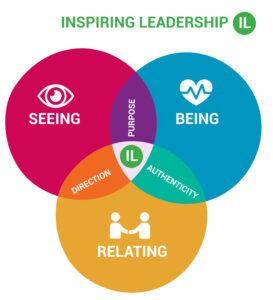
“Move from Informing to inspiring”
Leaders in workplaces juggle the demands of compliance with the need for meaningful connections. With resources low and demands high, it can be difficult to find a balance between informing and inspiring. In this program, we use the SEE, BE, RELATE model to build self-awareness, knowledge and communication skills. People are encouraged to reflect on their current leadership style, share what already works with their teams, and collaborate to form new ideas and ways of working. This includes building psychological safety as well as high quality connections, known predictors of workplace wellbeing.
When leaders;
- SEE themselves as a leader and behave in alignment with this vision they are purposeful
- BEhave with confidence and relate well to others they are authentic in showing they care
- RELATE with others to create a shared vision the team has direction
Program outcomes
By the end of this session, people have;
• Language to describe their leadership style
• Awareness or current challenges in their context
• A willingness to grow and learn as a leader
• Confidence in their ability to lead effectively
• Awareness of how to create high quality connections
• Strategies to build psychological safety
• Toos to ensure people feel valued and respected
• An awareness of how to support the wellbeing of their tea

